MercoPress. South Atlantic News Agency
Tag: Theresa May
-
Thursday, January 24th 2019 - 06:00 UTC
May/Sturgeon meeting confirm the divide between the two leaders over Brexit
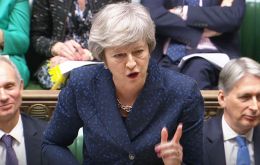
First Minister Nicola Sturgeon and Prime Minister Theresa May have met for talks in London after clashing over a second Scottish independence vote. The Downing Street summit was part of what Mrs. May called an “enhanced role” for the Scottish government in Brexit.
-
Wednesday, January 23rd 2019 - 07:28 UTC
Sturgeon to London to meet Mrs. May; First Minister favors extension of Article 50

Scottish First Minister Nicola Sturgeon is heading to London for Brexit talks with Prime Minister Theresa May. Mrs. May is attempting to build support for her withdrawal plan and is holding talks with opposition parties and the Scottish and Welsh governments.
-
Tuesday, January 22nd 2019 - 08:07 UTC
Brexit: PM May pledges a more flexible, open, inclusive approach involving Parliament

Theresa May has promised to take a more “flexible, open and inclusive” approach to involve Parliament in negotiating a future relationship with the EU as she seeks to revive her Withdrawal Agreement.
-
Monday, January 21st 2019 - 07:58 UTC
Theresa May back to Parliament to explain her next moves

Theresa May will try to convince Tory Brexiteers and DUP MPs to back her withdrawal deal by resolving Irish backstop concerns, Cabinet sources say. Last week, Mrs May said she would focus on cross-party talks to get a Brexit deal accepted by Parliament.
-
Friday, January 18th 2019 - 10:01 UTC
EU prepares contingency plans for a UK disorderly departure
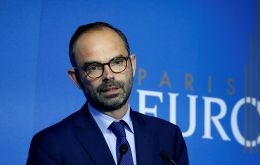
French Prime Minister Edouard Philippe has said a no-deal Brexit looks “less and less unlikely” and has launched a contingency plan to prepare for it. After the UK Parliament rejected the withdrawal agreement, Mr Philippe said laws had to be passed and millions invested in French ports and airports.
-
Thursday, January 17th 2019 - 08:44 UTC
EU frustrated, (and divided), but waiting for Mrs. May and Westminster Brexit B plan

European Council President Donald Tusk has hinted that the UK should stay in the EU, after the prime minister's Brexit deal was rejected in parliament. “If a deal is impossible, and no-one wants no deal, then who will finally have the courage to say what the only positive solution is?” he tweeted.
-
Thursday, January 17th 2019 - 07:31 UTC
PM May wins no-confidence vote; calls on all parties to work constructively to forward Brexit
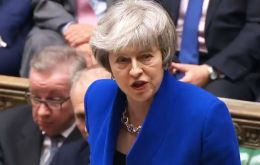
Theresa May has called on MPs to “put self-interest aside” and “work constructively together” to find a way forward for Brexit. Earlier, the prime minister won a vote of no confidence by 325 to 306, as rebel Tory MPs and the DUP backed her to stay in No 10. But just 24 hours before, both groups ensured her Brexit plan was voted down.
-
Wednesday, January 16th 2019 - 06:20 UTC
Brexit: what follows? Anybody's guess, but Tories won't yield to Corbyn
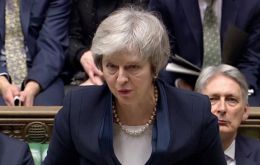
It was a Tuesday evening of high-stakes and unprecedented drama that will have an impact far beyond the UK. Prime Minister Theresa May's plan for leaving the European Union - the only one on the table - was voted down by parliament on Tuesday. And, given the constant stream of analysis and speculation, you could be forgiven for feeling a little overwhelmed by it all.
-
Wednesday, January 16th 2019 - 05:57 UTC
PM May Brexit deal pulverized by Parliament; Corbyn tables a no confidence vote for this Wednesday
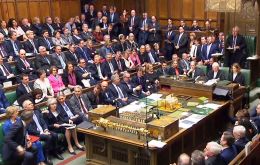
Prime Minister Theresa May's Brexit deal was rejected in Parliament by 230 votes - the largest defeat for a sitting government in history. MPs voted by 432 votes to 202 to reject the deal, which sets out the terms of Britain's exit from the EU on 29 March.
-
Tuesday, January 15th 2019 - 08:44 UTC
Theresa May and Parliament in their Brexit labyrinth
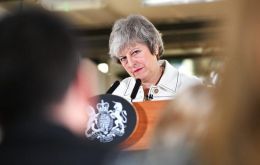
British Prime Minister Theresa May is facing likely defeat in Parliament when she asks MPs to approve her Brexit deal this Tuesday. That result would trigger huge uncertainty about the future of Britain's exit from the European Union.
